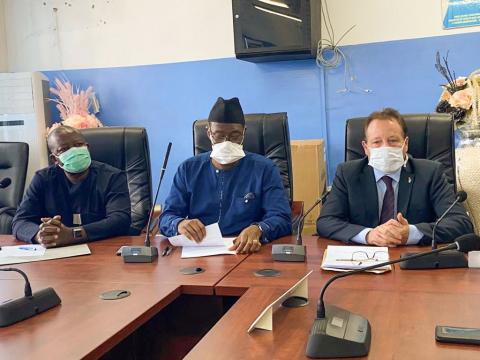By Kemo Cham
Sierra Leone is set to up its Covid-19 testing capacity from 500 to 1000 tests per day, according to the World Health Organization (WHO).
The WHO country office announced on Friday that the development was made possible through a collaboration between it and the German government, which is providing a grant of €500,000 though the German Technical Cooperation (GIZ).
The funding will make it possible for Sierra Leone to procure urgently needed laboratory equipment for the diagnosis and confirmation of COVID-19 cases.
The UN health agency will facilitate the timely procurement and supply of the consumables and equipment for coronavirus testing, including polymerase chain reaction (PCR) tests, which are the gold standard; viral isolation kits; and viral transport media with swabs, according to a news release from the WHO country office, which was shared with Politico.
“We realized that limited testing is a constraining factor, with a significantly low lab capacity in the response in Sierra Leone, Dr Evans Liyosi, WHO Country Representative, told journalists at a press conference held at the Ministry of Health and Sanitation in Freetown.
Dr Liyosi thanked the German government for the support which he said had both short term and long term benefits for the country.
“This support has both short and long term benefits as it will inevitably help to improve the skill sets of laboratory staff and in the long term, the diagnostic sector in general,” he said.
Like many African countries, Sierra Leone is currently battling with rising cases of Covid-19, amidst high community transmission.
Experts say the best way to cut down transmission is to scale up testing, which is actually one of five key strategies of the government in its response to the pandemic.
A shortage of laboratory facilities and man power has been a major hindrance to Sierra Leone’s response efforts, hence the importance of the GIZ funding.
Minister of Health, Prof. Alpha T. Wurie, noted this when he cited lack of adequate resources as having forced the country to be selective in its approach to the pandemic, thereby focusing on testing primary contacts.
“We feel that our surveillance, laboratory and treatment centres have interrelated so well in this response. However, we have been quite selective with regards to testing. We have mainly tested primary contacts because of the limited availability of test kits. But today it is pleasing that what this support could procure would double what exists in country as we move towards community testing and testing in the various hotspots” he said at the press conference.
The WHO says laboratory testing allows early detection of COVID-19 cases, noting that it is critical in effectively controlling the spread of the disease.
As of last week, Sierra Leone had conducted 16,000 tests since it began responding to the pandemic, with a positivity rate of 11%, according to figures from the National Covid-19 Emergency Response Center (NACOVERC).
The PCR test is being done in five molecular laboratories in the country, including the Jui Hospital P3 Lab, the Connaught National Teaching and Referral Hospital, the Central Public Health Reference Lab in Lakka, the 34 Military Hospital at the Wilberforce Barracks, and the Kenema Government Hospital in the eastern Kenema District.
Under this GIZ support, Sierra Leone’s testing capacity will be expanded to three other districts - Makeni, Bo, and Kambia - through the upgrading of their laboratory infrastructure.
In addition, the WHO Country office plans to recruit and train 30 laboratory scientists to support COVID-19 testing in multiple laboratories across the country, including the Freetown International Airport (Lungi), which was reopened last Wednesday, three months after it was shut down due to fears of the pandemic.
Before now, the global health agency had hired two international consultants to support training and mentorship of laboratory scientists in the country.
WHO will also provide incentives to the recruited lab scientists for a period of six months.
Horst Gruner, German Ambassador to Sierra Leone, explained why Germany thought it fit to help Sierra Leone at this crucial juncture of the global Covid-19 pandemic response.
“While the case numbers have drastically reduced in Germany, we can only succeed if we have a global success and that is why we are supporting the international response,” he said at the press conference, adding: “On top of the global response, we are happy to collaborate with WHO to support Sierra Leone in the fight against COVID-19. We will get over this together.”
Copyright © 2020 Politico Online








